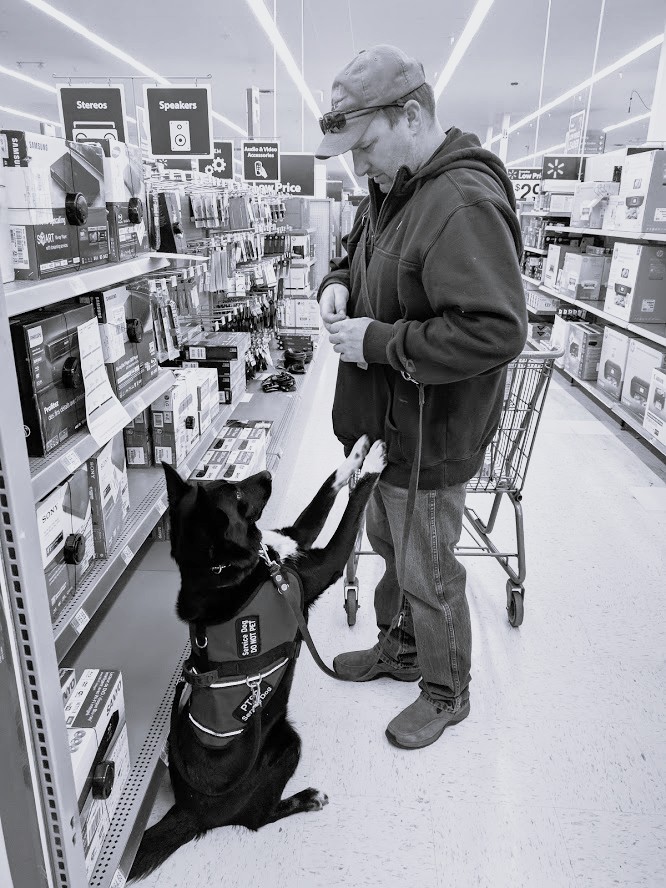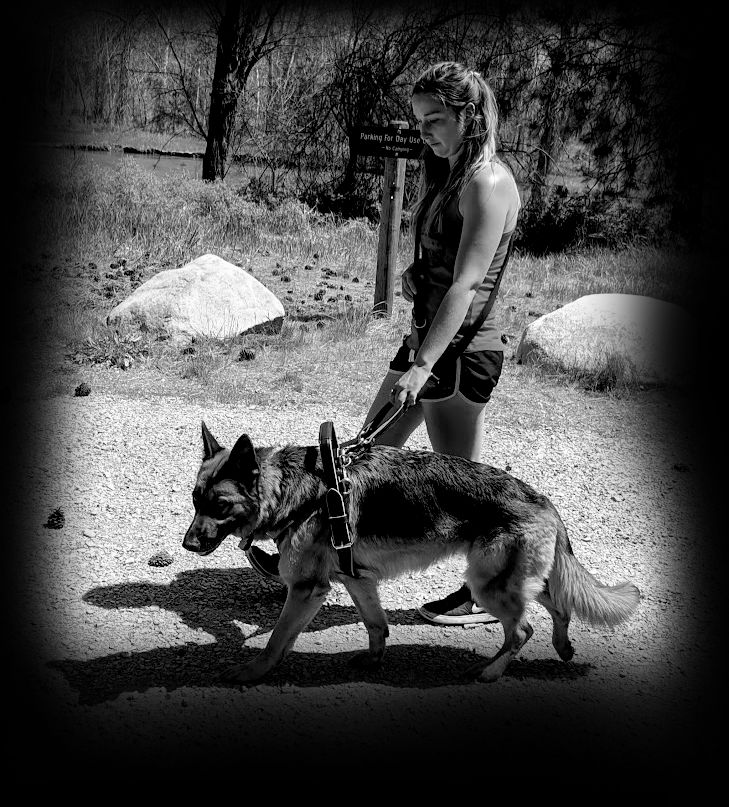Service Dog Program
Life-Saving Independence Through TrainingABOUT OUR PROGRAM
We are an OWNER-ASSISTED SERVICE DOG TRAINING PROGRAM.
What does that mean?
- Service dog handlers have 100% ownership of their dogs
- Service dog owner/handlers play an active role in the raising, socialization, and training process for their dog. We find that by involving our handlers in each step of the program and ensuring they are part of the whole process, we see better long-term success for the dog/handler as a working team.
- We completely custom-build each training program for each dog and handler team. This includes creating a training plan for teaching the tasks each handler needs, as well as designing a board & train, private lesson, or hybrid format that works best for each team.
What it does NOT mean:
- We do not have aleady-trained dogs available for sale or placement
- We also don’t breed or sell puppies as service dog prospects. If you don’t already have a dog, that’s OK! We can help you with the selection process to make sure you have the best chance of success.
PROGRAM GOALS
To create an accessible option for disabled handlers to have a service dog they can train to their specific needs
To clarify and demystify the service dog process and the laws surrounding the use of a trained service animal, so handlers can utilize their dogs with confidence
What type of dogs do you train?
Because we custom-tailor each program for our individual teams, we can assist with many different disabilities and they don’t always fit into a pre-defined category. However, all of our service dogs must be trained to perform specific tasks to assist their handlers, in accordance with service dog law.
Exception: We do not train seeing-eye/guide dogs for visually-impaired handlers
*We do NOT train Emotional Support Animals for public access. Psychiatric service dogs must still be trained to perform specific tasks.
Below are some of the most common types of service dog tasks we train (but not an exhaustive list):
Mobility Assistance
- Retrieve Objects for handler
- Open and Close Doors
- Push Handicap Button
- Turn on and off lights
- Assist to remove clothing (pulling off socks, pants, jackets. etc.)
- Momentum pull and counterbalance
- Assist with position transfer (sit to stand, etc.)
- Pull a wheelchair
Psychiatric Assistance (Includes PTSD & Autism)
- Create space for handler in crowds (Blocking / orbiting)
- Watch behind handler for strangers approaching
- Alert handler to impending medical crisis (panic attack, flashback, meltdown, etc.)
- Deep Pressure Therapy to calm handler after medical crisis or to reduce length/severity of medical episode
- Alert to/interrupt maladaptive behavior (i.e. skin or nail picking)
- Interrupt meltdowns/crying
- Turn on lights in dark room/perform room searches
- Provide tactile grounding (physical contact on cue, head in lap for petting, persistent/soothing licking
- Find Help in case of medical emergency (parent, family member, even a stranger)
- Help prevent bolting
Scent-Based Medical Alert (Allergen Detection, Diabetic Alert, etc.)
- Train dogs to identify and alert to the presence of specific odors and alert their handlers, such as:
- Dangerous food allergens
- High/low blood sugar levels
- Seizures
- Other medical episodes such as migraines, autoimmune reactions, etc.
- Teach a specific, recognizable alert for the handler
- *Note – Scent-based medical alerts (exception: diabetic alert dog) do not have enough current research behind them to guarantee results. The methods for collecting scent samples during medical events and training dogs to orient on these samples is a sound practice, but we cannot guarantee that all dogs will be able to reliably perform these alerts. For any team wishing to train scent-based medical alerts, we recommend this not be the only task the dog is trained to perform.
Seizure Response
Note – We cannot guarantee a dog we train will be able to detect seizures before they occur. Some dogs possess this ability innately, and we can shape and reinforce this ability into a reliable alert. We can also do scent-based seizure alert training (See “scent based medical alerts” above), but research in this area is lacking and results are not guaranteed.
If the dog does not possess a natural alert and is unsuccessful with scent-based training, we can still train response/assistance behaviors for seizures, such as:
- Rolling a handler over onto his/her side to prevent aspiration
- Lying next to/on top of the handler or under the handler’s head to prevent injury
- Assisting the handler to recover or to navigate to a safe location (a seat, the handler’s vehicle, etc.)
- Teach a dog to “Find Help” by locating a friend/family member or even a stranger.
- Teach a dog to retrieve food, water, or medications to an individual recovering from a seizure
HOW DO I GET STARTED?
Before we can begin a service-dog training program, you need to have a dog to train. Being an OWNER TRAINING PROGRAM means that handlers bring their own dogs to us for training – but not all dogs make good service dogs. You will find yourself in one of the two situations below:
I NEED HELP FINDING A DOG
If you do not yet have a dog, or if your current dog is not suitable service dog candidate, our trainers can assist you in a variety of ways, both virtual or in-person:
- Phone or email consultation to help determine the ideal breed/age/type of dog for training based on your individual needs
- Phone, email, or virtual consultation with your chosen breeder or rescue organization to discuss ideal traits or to screen a potential candidate dog
- Researching breeders to find potential candidates
- Conducting in-person assessments on puppy litters or candidate dogs for local breeders, rescues, or individuals (within the greater Missoula/Bitterroot valley area.)
Click Here to Read About Choosing A Service Dog Candidate
Virtual Consultations – $70/hour
In-Person Assessments – $95/hour plus mileage
I HAVE A DOG I WANT TO TRAIN
For clients who have a dog they wish to train as as service dog, our first step will be to assess your dog to determine if he or she makes a suitable service dog candidate. We will perform an in-person, hands-on assessment and go over the results with you. From there, we can determine whether or not to continue training or if we need to look for a more suitable service dog candidate.
- Temperament tests on puppies 49 days-6 months old do not always predict adult temperaments. All puppies may begin our puppy-training program and will be re-assessed as they progress and age.
- Dogs who initially pass an assessment may still be determined unsuitable if they demonstrate any “red flag” behaviors during the training process, such as aggression towards humans or other dogs, or extreme fear or environmental sensitivities. Dogs who display these behaviors may be dismissed from our program.
On-Site Temperament Assessment, Training Consultation, Construction of Training Plan – $100
FILL OUT OUR APPLICATION
Once you know what your starting situation is, we ask that you fill out our service dog program application by clicking the button below. This will give our trainers the preliminary information we need to determine how best to help you.
Once we’ve received that application, one of our trainers will reach out to you either to work with you on finding a suitable service dog candidate, or for scheduling your existing dog’s evaluation.
Build A Training Program
Once you’ve identified the dog you’ll be training, you’ll work with one of our trainers to build a program that addresses the specific tasks you need your dog to perform to mitigate your disability(ies). We can utilize our Board & Train option, our Private Lesson option, or a combination of the two. We also take into account a dog’s age and the handler’s learning style and pace so teams have the best chance of success.
Our program addresses four critical components of a well-trained service dog team:
- Foundation Obedience Training
- Service Dog Task Training
- Public Access Training
- Handler Education on service dog rights and laws
Pricing Guidelines
Below is a general guideline of costs for our service dog program, via Board & Train and private lessons. This guideline assumes a dog is begining with no previous training and is a suitable candidate. Actual costs will vary based on the number and type of tasks needing to be trained, and a formal quote will be drafted after completion of your hands-on assessment and consultation.
Training Evaluation – $100
Training Gear (Including leashes, collars, vests, harnesses, etc.) – $250-$500
BOARD & TRAIN
Service Dog Puppy Jump Start – 2 Weeks – $1,400
Foundation Partnership Training – 2 Weeks – $1,800
Advanced Training (PA Prep) – 2 Weeks – $2,000
(Recommended) – Off Leash – 2 Weeks – $2,000
Task Training – VARIES – $1,800-$5,400
Public Access Training – 4 Weeks – $4,000
Total Board & Train Estimate 12-20 Weeks $9,600-$18,000
PRIVATE LESSONS
Service Dog Puppy Jump Start – 4 Lessons – $360-$380
Foundation Partnership Training – 4 Lessons – $380-$420
Advanced Training (PA Prep) – 4 Lessons – $380-$420
(Recommendedd) – Off Leash – 4 Lessons – $380-$420
Task Training – VARIES – $380-$1,260
Public Access Training – 8 lessons – $840
Total Private Lesson Estimate 24-32 lessons – $2,360-$3,360


